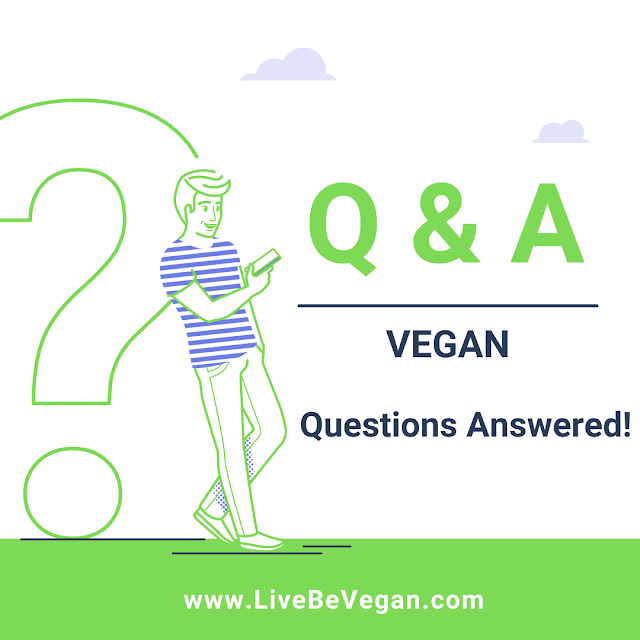As more people around the world are embracing a vegan lifestyle, it's natural for questions and concerns to arise. In this article, I'll address some of the most common questions about veganism to provide a clear and comprehensive understanding of the choices and beliefs behind this ethical and environmentally conscious lifestyle.
1. Isn’t it hard to be vegan?
Transitioning to a vegan lifestyle might seem challenging at first, but with the growing availability of plant-based products and resources, it's becoming easier than ever before. There are numerous plant-based alternatives for meat, dairy, and other animal products, making the shift more seamless. Many find that the initial adjustment phase is short-lived, and the benefits in terms of health, ethics, and the environment far outweigh any perceived difficulties.
2. Where do you get your protein?
Plant-based diets can provide all the essential amino acids and proteins needed for optimal health. Legumes (such as beans, lentils, and chickpeas), tofu, tempeh, seitan, quinoa, nuts, seeds, and even certain vegetables are excellent sources of protein. A well-balanced vegan diet can easily meet protein requirements.
3. I only eat free-range eggs. That’s okay, right?
While free-range eggs may provide better living conditions for hens compared to conventional factory farming, they still raise ethical and environmental concerns. Male chicks are often culled(killed) in the egg industry, and hens may still face issues like overcrowding and early culling. From an ethical standpoint, many vegans choose to avoid all forms of animal exploitation, including eggs, and opt for plant-based alternatives.
4. Isn’t it expensive to be vegan?
A vegan diet can be both budget-friendly and cost-effective. Staples like beans, rice, pasta, and seasonal fruits and vegetables tend to be affordable. While some specialty vegan products might be pricier, they're not necessary for a healthy diet. With proper meal planning and a focus on whole foods, being vegan can be quite economical.
5. I could never be vegan; I love the taste of meat too much.
Transitioning to a vegan diet doesn't mean sacrificing taste or flavor. The growing variety of plant-based meat alternatives offers similar textures and tastes to traditional animal products. Additionally, exploring new recipes and cuisines can be an exciting way to discover a whole world of delicious, plant-based foods.
6. Doesn’t the bible endorse eating animals?
Religious interpretations vary, but many religious texts promote compassion and stewardship for all living beings. Some interpretations suggest that adhering to a plant-based diet aligns with these values by promoting kindness and reducing harm to animals and the environment.
7. Haven’t we evolved to eat meat? It’s natural!
While early human ancestors did include some animal products in their diets, our digestive systems have evolved to accommodate a wide range of foods, including plant-based options. In modern times, science and technology have provided us with ample plant-based nutrition alternatives that allow us to thrive without relying on animal products.
8. What would happen to all the animals if we stopped eating them?
If society shifted away from consuming animals, the demand for meat, dairy, and eggs would decrease, leading to a reduction in factory farming. Some animals could be adopted, and others might thrive in sanctuaries. Over time, the breeding of animals for consumption would diminish, resulting in fewer animals raised solely for food.
9. What’s wrong with honey?
Honey production involves the exploitation of bees and often includes practices that can harm their colonies. Bees work hard to produce honey for themselves, and commercial honey production can disrupt their natural behaviors and life cycles. Fortunately, there are plenty of plant-based sweeteners that can be used as alternatives to honey.
10. You don’t have to kill animals to get dairy and eggs, so what’s wrong with those products?
While animals might not be killed directly for dairy and eggs, the industries still involve practices that many consider unethical. Dairy cows and egg-laying hens often endure confined and unnatural living conditions, and their offspring may still face harm. Choosing plant-based alternatives ensures that no animals are exploited in the process.
11. Cows need to be milked, don’t they? We’re doing them a favor.
Cows produce milk for the same reason humans do: to nourish their offspring. In industrial dairy farming, cows are often subjected to forced pregnancies and have their calves taken away shortly after birth. This cycle of separation and milk production can lead to physical and emotional distress for the cows. By consuming plant-based milk alternatives, we can support both animal welfare and our own health.
Adopting a vegan lifestyle involves a consideration of ethical, environmental, and health factors. As society becomes more conscious of the impacts of our choices, embracing a plant-based diet can lead to positive changes for ourselves, animals, and the planet. By addressing these common questions, we hope to provide clarity and insight into the world of veganism.
Resources
The following links to resources will provide you with in-depth information, research findings, recipes, and community support related to veganism:
Nutrition and Plant-Based Diets:
Ethics and Animal Welfare:
Environmental Impact of Animal Agriculture:
Plant-Based Recipes and Cooking:
Religious Perspectives on Veganism:
Environmental and Ethical Impact of Honey:
Factory Farming and Animal Agriculture:
Health and Nutrition Studies:
Vegan Community and Support:

Comments
Post a Comment
We welcome your input!